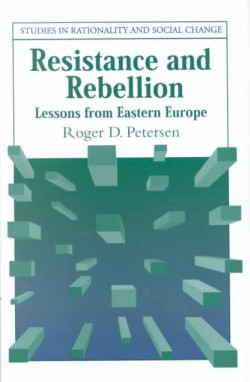Biography
Roger Petersen holds BA, MA, and PhD degrees from the University of Chicago. He has taught at MIT since 2001 and is the Arthur and Ruth Sloan Professor of Political Science Emeritus. Petersen focuses on within-state conflict and violence. He has written four books: Resistance and Rebellion: Lessons from Eastern Europe (Cambridge University Press, 2001), Understanding Ethnic Violence: Fear, Hatred, Resentment in Twentieth Century Eastern Europe (Cambridge University Press, 2002), Western Intervention in the Balkans: The Strategic Use of Emotion in Conflict (Cambridge University Press, 2011), and “Death, Domination, and State-Building: The US in Iraq and the Future of American Military Intervention, (Oxford University Press, 2024).” He has taught classes on military intervention, civil war, civil-military relations, and emotions in politics, as well as classes focusing on regional conflicts in the Balkans and the Middle East.
Teaching
Selected Publications
Roger Petersen, “The Future of American Military Intervention,” Horizons No. 18 (Winter 2021)
Roger Petersen, “Emotions and Backlash in US Society and Politics,” The British Journal of Politics and International Relations (September 2020)
Review of Timothy Andrews Sayle, Jeffery A. Engel, Hal Brands, and William Inboden, The Last Card: Inside George W. Bush’s Decision to Surge in Iraq. H-Diplo Roundtabel XXII-7, October 12, 2020.
Roger Petersen, “Anger and Politics,” in Carolyn Price and Eric Walle, eds., Emotion Researcher: ISRE’s Sourcebook for Research on Emotion and Affect (August 2019)
Roger Petersen, "Between Two Caesars: The Christians of Northern Iraq," Providence (Winter 2018) (With Matthew Cancian)
Roger Petersen, “Emotions as the Residue of Lived Experience” PS: Political Science & Politics Vol. 50, No. 4 (October 2017)
Roger Petersen, "Western Interventions and Occupations as Threatened Orders," written for the Collaborative Research Centre 923 Project on Threatened Orders, Tuebingen University, Germany, published in Erwald Frie and Mischa Meier, eds., Aufruhr-Katastophe-Konkurrenz-Zerfall:Bedrohte Ordnungen als Thema der Kulturwissenschaften (Mohr Siebeck, 2014)
Roger Petersen, "Guilt, Shame, Balts, Jews," in Daniel Chirot, Gi-Wok Shin, and Daniel Sneider, eds., Confronting Memories of World War II: European and Asian Legacies (University of Washington Press, 2014)
Roger Petersen, "Roles and Mechanisms of Insurgency and the Conflict in Syria's War," Project on Middle East Political Science, Briefing 22, December 2013.
Roger Petersen, "Identity, Rationality, and Emotion in the Processes of State Disintegration and Reconstruction," in Kanchan Chandra ed., Constructivist Theories of Ethnic Politics (Oxford University Press, 2012)
Roger Petersen, "Varieties of Insurgency in Iraq, 2003-2009," case study prepared for the Naval War College Center for Irregular Warfare and Armed Groups (November 2011) (With Jon Lindsay)
Roger Petersen, "Revenge or Reconciliation: Theory and Method of Emotions in the Context of Colombia's Peace Process," in Morton Bergsmo and Pablo Kalmonowitz,eds., Law in Peace Negotiations (Torkel Opsahl, 2010) (With Sarah Zukerman)
Books
-

Death, Dominance, and State-Building: The US in Iraq and the Future of American Military Intervention
Roger Petersen
- Provides both a comprehensive and sophisticated understanding of the conflicts and consequences of the Iraq war over the 2003-2023 period
- Incorporates the voices and insights of US military personnel and Iraqi citizens
- Uses the findings and lessons from Iraq to address the future of American military intervention
-

Western Intervention in the Balkans: The Strategic Use of Emotion in Conflict
Roger Petersen
Conflicts involve powerful experiences. The residue of these experiences is captured by the concept and language of emotion. Indiscriminate killing creates fear; targeted violence produces anger and a desire for vengeance; political status reversals spawn resentment; cultural prejudices sustain ethnic contempt. These emotions can become resources for political entrepreneurs. A broad range of Western interventions are based on a view of human nature as narrowly rational. Correspondingly, intervention policy generally aims to alter material incentives (“sticks and carrots”) to influence behavior. In response, poorer and weaker actors who wish to block or change this Western implemented “game” use emotions as resources. This book examines the strategic use of emotion in the conflicts and interventions occurring in the Western Balkans over a twenty-year period. The book concentrates on the conflicts among Albanian and Slavic populations (Kosovo, Montenegro, Macedonia, South Serbia), along with some comparisons to Bosnia
-

-

Understanding Ethnic Violence: Fear, Hatred, Resentment in Twentieth Century Eastern Europe
Roger Petersen
This book seeks to identify the motivations of individual perpetrators of ethnic violence. The work develops four models gleaned from existing social science literatures: Fear, Hatred, Resentment, and Rage. The empirical chapters apply the models to important events involving ethnic conflict in Eastern Europe, from the 1905 Russian Revolution to the 1990's collapse of Yugoslavia. Each historical chapter generates questions about the timing and target of ethnic violence. The four models are then applied to determine which is most effective in explaining the observed patterns of ethnic conflict
-
Critical Comparisons in Politics and Culture
Leading anthropologists and political scientists are brought together in this volume to debate the problem of comparison, taking up a variety of topics from nationalist violence and labor strikes to ritual forms and religious practices. The contributors criticize conventional forms of comparative method, and introduce new comparative strategies, ranging from abstract model building to ethnographically based methods. They represent a wide variety of theoretical positions, from rational choice theory to interpretivism, and the issues are clarified in the cut and thrust of debate.
Media
Bulletin of the Atomic Scientists, "Here’s what Western leaders need to remember about Zelensky’s emotional appeals", March 21, 2022
Moderator, "Starr Forum: America's Civil-Military Crisis," MIT Center for International Studies, June 11, 2020.
Quoted in "We need political parties.But their rabid partisanship could destroy American democracy," vox.com, September 5, 2017.
New York Times, January 16, 2016, "In Syria, Politics Can be More Effective than Military Action."
Recent News
-
Roger Petersen Appointed SSP Acting Director (2016-17)
September 8, 2016






